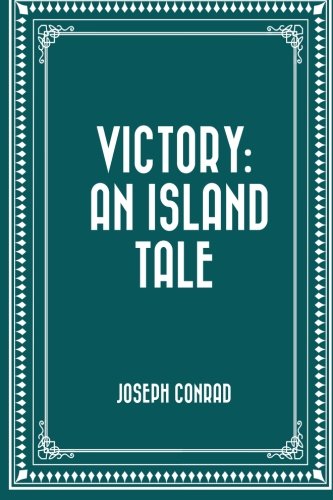Victory
An Island Tale
Joseph Conrad
BOOK REVIEW

In a world where the struggle for power and personal redemption intertwine, Victory: An Island Tale by Joseph Conrad emerges as a profound exploration of the human spirit. This narrative, rich with philosophical nuance and existential inquiry, whisks you away to the lush landscapes of a remote island, evoking the dreamlike yet perilous journey of its characters against a backdrop of colonialism and treachery.
Conrad, a master of capturing the complexities of the human condition, dives headfirst into the tumultuous waters of identity, desire, and moral conflict. The novel's protagonist, Axel Heyst, a solitary man haunted by his past, grapples not only with his demons but also with the larger-than-life personalities surrounding him. His reluctant embrace of the role of a savior when he encounters the enigmatic Lena exemplifies the fierce tug-of-war between selfishness and altruism, leaving you questioning your own capacities for both.
As you traverse the verdant yet unforgiving island, Conrad's prose envelops you in an atmospheric haze, blending beauty with an underlying sense of foreboding. The island itself becomes a character-its splendor concealing the darker elements of human nature. The lush descriptions draw you into a world where the boundary between civilization and savagery is as thin as the air you breathe. Every page turns into a vivid painting, leaving an indelible mark on your psyche.
Yet, this is not merely a tale of adventure; it's a gripping commentary on the existential dilemmas that plague humanity. Conrad grapples with the concept of victory itself, challenging the reader to reconsider what it truly means to triumph. Is it wealth, domination, or the mere assurance of one's existence? In a time echoing with the struggles for colonial power and identity, Conrad's exploration becomes eerily relevant, as it prompts you to reflect on your own battles against societal constraints and personal limitations.
The emotional heft of Victory is not lost on its readers-opinions abound, illustrating the novel's complex reception. Some praise Conrad's ability to weave a compelling narrative that reflects broader sociopolitical issues, while others critique its pacing and dense symbolism. A community of readers has emerged, passionately debating the layers of meaning nestled within the text. The division is stark: one group celebrates Conrad's storytelling as a tour de force of literary brilliance, while the other finds the narrative meandering, citing frustrations with pacing and character depth.
But this book demands attention. It's a meditation on despair and hope, isolation and connection-an emotional rollercoaster that leaves you breathless. The figures that populate Heyst's life-each with their own desires and failures-are mirrors that reflect your own struggles and aspirations. You can't help but empathize with their plight, even as they navigate murky moral waters. Their fates intertwine in a ballet of fate and choice, each decision resonating beyond the confines of the story, echoing in your own life as you contemplate your values and decisions.
Conrad wrote during a period when imperialism was at its zenith, and his insights cut through the fabric of society, exposing the rot beneath its surface. This context adds layers to your reading experience; you are not just a passive observer, but an active participant in a dialogue about power, morality, and the price of existence. It's a wake-up call urging you to confront the uncomfortable truths of your reality, and perhaps even to relate them to today's world, where questions of dominance and identity remain as poignant as ever.
As you delve into Victory, prepare for a mind-altering journey that lingers long after you've turned the last page. You may laugh, cry, or furrow your brow in thought, but one thing is certain: the emotional tapestry woven by Conrad will challenge your perceptions and ignite a flame of curiosity within you. Ultimately, Victory: An Island Tale is not just a story of struggle and triumph; it's an invitation to discover the vastness of your own emotional landscape and understand that true victory lies not in conquest, but in understanding oneself and your place in the world. ✨️
📖 Victory: An Island Tale
✍ by Joseph Conrad
🧾 210 pages
2015
#victory #island #tale #joseph #conrad #JosephConrad